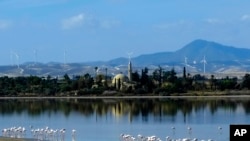Cyprus, a small, divided island nation in the eastern Mediterranean Sea, has played an outsized role throughout history because of its status as a jewel coveted by much bigger powers.
Its strategic location between three continents - Europe, Africa and Asia - has made it a prize, economically and politically.
Reunification talks on the island are at a critical juncture, with top officials from Britain, Greece, and Turkey joining the meeting in Geneva on Thursday to tackle the thorny issue of security.
Here's a look at Cyprus through the ages:
Cyprus in antiquity
In ancient times, Cyprus' location guaranteed it a role in flourishing trade routes.
Alexander the Great in 333 B.C. captured the island as part of his campaign against the Persians. As the supposed birthplace of Aphrodite, the Greek goddess of love, Cyprus also gained cult status in the Hellenic world.
The Romans invaded in 58 B.C. and held onto Cyprus for nearly five centuries, interrupted by a short period under Cleopatra of Egypt. Roman rule brought stability and the economy flourished.
When the Roman empire split in two at the end of the 4th century, Cyprus was part of the Byzantine empire and a more chaotic era began.
Cyprus and the Crusades
From the middle of the 7th century, Cyprus suffered wave after wave of Arab raids before the Byzantine emperor re-established a firm grip toward the end of the millennium.
In the 12th century, Cyprus was embroiled in the Crusades, becoming a launching pad for Christian armies aiming to reclaim the Holy Lands, including those from England's King Richard I.
He eventually sold the island to fellow crusader Guy of Lusignan, the displaced king of Jerusalem, in 1192.
The Lusignan dynasty lasted for three centuries and marked a period of prosperity, with the island's elites profiting from growing trade with Venice and Genoa. Average Cypriots, however, chafed under these feudal times.
A Venetian power base
In 1489, the commercially minded Venetians took control of Cyprus.
They maintained the unpopular feudal system as they used the island as a defensive military base against the rising power of the Ottoman Empire, which had already captured Constantinople, the Byzantine capital.
The Venetians' struggle to prevent the Turks from attacking the island forms the backdrop to "Othello," one of Shakespeare's greatest tragedies.
Cyprus was eventually conquered by the Ottomans in 1571 after the Venetian chief Marcantonio Bragadin was captured and flayed alive in the port of Famagusta.
Turkish rule would remain for about three centuries.
The age of the Sultans
Turkish influence in Cyprus has had long-term repercussions to this day.
Although the Ottomans engaged with the island's Christian Orthodox representatives, its era of dominance was largely one of stagnation.
In the early part of the 19th century, the Greek independence movement started inspiring the island's ethnic Greek majority.
Reprisals against Greek rebels and those accused of conspiring with them fed a growing desire for union with modern Greece.
Cyprus and the British empire
As the Ottoman empire faced a raft of nationalist movements, the British saw their chance to gain a foothold in Cyprus.
In 1878, the British took control of the island in exchange for military aid in the Ottomans' fight with Russia.
Britain then annexed Cyprus at the start of World War I when the Ottomans sided with Germany. The island helped defend Britain's crucial trade routes to India and safeguard its interests in the Middle East.
Britain transformed Cyprus, introducing its legal code and customs like driving on the left side of the road. But as the years went by, local calls for union with Greece kept growing.
A guerrilla campaign forced Britain out and Cyprus became independent in 1960.
Modern Greece and Turkey
Independence didn't make things quieter in Cyprus, though Britain, Greece and Turkey as so-called 'guarantor' powers were meant to keep the peace.
By 1963, the acrimony between pro-union Greek Cypriots and Turkish Cypriots had turned to violence.
The following year the United Nations arrived to keep the peace.
More than 50 years later, they're still there, mainly patrolling the "Green Line" buffer zone.
Cyprus split into an internationally recognized, Greek-speaking south and a breakaway Turkish-speaking north in 1974 - after Turkey invaded following a coup by supporters of union with Greece.
Tens of thousands became refugees. A series of attempts to reunify the island have ended in failure, most notably in 2004 when Greek Cypriots voted against a proposed peace deal.
The next referendum in Cyprus
Negotiators hope to make enough progress this week that the island's two sides vote this year on reunification.
Making sure there's no repeat of the events of 1974 will be central to any success.
Greek Cypriots say enough territory must be returned to their control but Turkish Cypriots want to limit the amount, for telling their people to leave what they have considered home for decades is unlikely to go down well.
It's a fine balance that Britain, Greece and Turkey as well as the domestic Cyprus communities have to tread.




